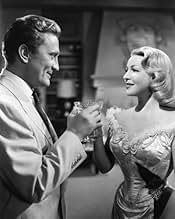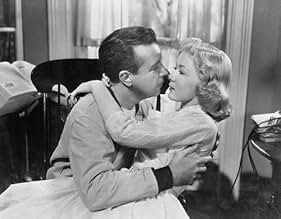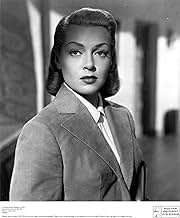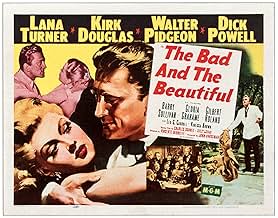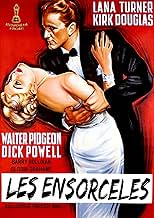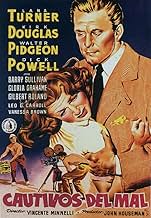An unscrupulous movie producer uses an actress, a director and a writer to achieve success.An unscrupulous movie producer uses an actress, a director and a writer to achieve success.An unscrupulous movie producer uses an actress, a director and a writer to achieve success.
- Director
- Writers
- Stars
- Won 5 Oscars
- 7 wins & 7 nominations total
Jay Adler
- Mr. Z - Party Guest
- (uncredited)
Stanley Andrews
- Sheriff
- (uncredited)
Ben Astar
- Joe - Party Guest
- (uncredited)
Barbara Billingsley
- Evelyn Lucien - Costumer
- (uncredited)
- Director
- Writers
- All cast & crew
- Production, box office & more at IMDbPro
Featured reviews
Winning an Oscar has nothing to do with the amount of on screen time, so the shortness of Grahame's role does not bother me. However, her cartoonish interpretation of a Southern Belle is simply not worthy of an Academy Award, especially when the role is intended to be seriously dramatic. Jean Hagen most certainly deserved the Supporting Actress honor for her APPROPRIATE comedic turn as an over-the-top, unfortunately voiced silent film actress in "Singing in the Rain." And, folks, that scene with an hysterical Lana Turner driving in the rain is, well, HYSTERICAL.
VM was an excellent director, but some of his films, especially the overwrought melodramas, simply do not hold up. Yes, they always look great, but often the performances in the dramas are of the scenery-chewing variety.
In regards to another user's post, I agree that the scenario of Powell's character identifying his wife is ridiculous. The same thought immediately crossed my mind when seeing it for the first time.
My feelings towards Douglas's performance are mixed. At times he hits the mark, but at others, it is pure ham.
The film is definitely worth seeing, but it does not deserve the status of "classic." Its presentation of the industry is clichéd. As others have stated, "Sunset Boulevard" blows this film out of the water.
VM was an excellent director, but some of his films, especially the overwrought melodramas, simply do not hold up. Yes, they always look great, but often the performances in the dramas are of the scenery-chewing variety.
In regards to another user's post, I agree that the scenario of Powell's character identifying his wife is ridiculous. The same thought immediately crossed my mind when seeing it for the first time.
My feelings towards Douglas's performance are mixed. At times he hits the mark, but at others, it is pure ham.
The film is definitely worth seeing, but it does not deserve the status of "classic." Its presentation of the industry is clichéd. As others have stated, "Sunset Boulevard" blows this film out of the water.
That one line summary makes me sound like I'm calling the Bad and the
Beautiful a case in 'tough love', where director Vincente Minnelli wags
his finger at what happens to some people (cough, David O. Selznick,
cough), while also showing too the joys of working in the business. But
it's a business at its most booming time, coming out of the 40s where
the producer was king, and the director had to vie for room at times to
really get his vision in. Here the producer Jonathan Shields is played
by Kirk Douglas as someone with big ideas at first- he even has an idea
to help make a scary movie about cats even more frightening by not
showing the cats (echoes of Val Lewton). Soon he rises the ranks and
becomes big enough to really call the shots all he wants, but it also
gets in the way of personal relationships, severs ties, and sometimes
even makes him out to be monstrous (there's one shot I remember all the
time where Douglas, in a big fit of anger against Lana Turner's
character, seems like he's a whole foot taller with the ego almost
manifested). The narrative of the film is a retelling by people who
knew him, a sexy but soon disillusioned actress, a director who once
worked with Shields but then got cut off from him, and a writer played
by Dick Powell.
Rashomon or Citizen Kane it is not in trying to reveal more grandiose and amazing things about human nature, but rather a supreme rumination on the good times and the bad times, possibly more of the latter.
What's great about Douglas's portrayal is that through the stories from the three ex-friends and co-workers and lovers, he becomes a very well-rounded character. At the core, of course, is the producer who at the time had as more creative say than anyone else on the set. This brings some of the great scenes ever shown about movie-making, such as the moment when Amiel, the director, tries to put Jonathan in his place about how a scene should be shot, "in order to direct a picture you need humility". Another comes with the moment when Jonathan and his soon to be 'asistant to the producer' has to object out of just being stunned. But more than Douglas, it's also tremendous, memorable screen time for Lana Turner, perhaps in her most successful performance in just sheer acting terms (not necessarily just in presence or style like in other pictures), and for Dick Powell, who with this and Murder My Sweet has two defining roles outside of his usual niche.
With many sweet camera moves, a script that crackles with the kind of scenes and dialog that makes one wish for the glory times of Hollywood's Golden Age, and at least four or five really excellent performances, The Bad and the Beautiful might not be as astounding and near-perfect as 8 1/2 or as funny as Bowfinger, but it ranks up there with the best movies about movie-making, and can make for some fine entertainment even for those who aren't really interested in how movies are made.
Rashomon or Citizen Kane it is not in trying to reveal more grandiose and amazing things about human nature, but rather a supreme rumination on the good times and the bad times, possibly more of the latter.
What's great about Douglas's portrayal is that through the stories from the three ex-friends and co-workers and lovers, he becomes a very well-rounded character. At the core, of course, is the producer who at the time had as more creative say than anyone else on the set. This brings some of the great scenes ever shown about movie-making, such as the moment when Amiel, the director, tries to put Jonathan in his place about how a scene should be shot, "in order to direct a picture you need humility". Another comes with the moment when Jonathan and his soon to be 'asistant to the producer' has to object out of just being stunned. But more than Douglas, it's also tremendous, memorable screen time for Lana Turner, perhaps in her most successful performance in just sheer acting terms (not necessarily just in presence or style like in other pictures), and for Dick Powell, who with this and Murder My Sweet has two defining roles outside of his usual niche.
With many sweet camera moves, a script that crackles with the kind of scenes and dialog that makes one wish for the glory times of Hollywood's Golden Age, and at least four or five really excellent performances, The Bad and the Beautiful might not be as astounding and near-perfect as 8 1/2 or as funny as Bowfinger, but it ranks up there with the best movies about movie-making, and can make for some fine entertainment even for those who aren't really interested in how movies are made.
One thing that I've always wondered is why no one looks at Hollywood more negatively than Hollywood itself. But whatever the reason, "The Bad and the Beautiful" pulls no punches in looking at its topic. The movie portrays some people explaining how they used to be friends of producer Jonathan Shields (Kirk Douglas) but have since turned against him. There's the director whom Shields promised a directing job but betrayed him, the writer who lost his wife to Shields's actions, and the actress whom Shields drove to madness.
I thought that one of the most effective scenes in the movie was Kirk Douglas holding Lana Turner in his arms. Here he is, this overbearing, hostile character forced to almost coddle his gorgeous female star; it might be showing how he may seemingly have exalted her, but he remains in a higher position and is merely using her and sending her into insanity. And the scene of her driving the car while completely upset elaborates on this idea.
And then, there's the writer. He and his wife move from Virginia hoping to get really big in Hollywood...until tragedy strikes. It all goes to show the disaster inherent in any industry (of course, Douglas's character exacerbates any problem). But anyway, this is a formidable part of cinema history; a precursor to movies like "The Player". Also starring Dick Powell, Walter Pidgeon and Gloria Grahame (who won Best Supporting Actress).
I thought that one of the most effective scenes in the movie was Kirk Douglas holding Lana Turner in his arms. Here he is, this overbearing, hostile character forced to almost coddle his gorgeous female star; it might be showing how he may seemingly have exalted her, but he remains in a higher position and is merely using her and sending her into insanity. And the scene of her driving the car while completely upset elaborates on this idea.
And then, there's the writer. He and his wife move from Virginia hoping to get really big in Hollywood...until tragedy strikes. It all goes to show the disaster inherent in any industry (of course, Douglas's character exacerbates any problem). But anyway, this is a formidable part of cinema history; a precursor to movies like "The Player". Also starring Dick Powell, Walter Pidgeon and Gloria Grahame (who won Best Supporting Actress).
Glossy MGM soaper has many things to recommend it, not the least of which is a surprisingly grounded, natural Lana Turner (looking great, even in ordinary jammies) playing a successful movie actress who, along with a top screenwriter and director, help producer-on-the-skids Kirk Douglas stage a comeback. Not especially revealing about Hollywood, which at this stage wasn't quite ready to unmask itself, but still engaging and intriguing. Douglas is well-cast (he spits out his lines with a terse jaw--nothing new--but he's right for this part and is commendable). Turner is a revelation and deserved at the very least an Oscar nomination for her work; the picture did go on to win Academy Awards in five categories, including Gloria Grahame as Best Supporting Actress; Charles Schnee, Best Screenplay; Robert Surtees, Best Cinematography, Black-and-White; Best Art Direction-Set Decoration, Black-and-White; and Best Costume Design, Black-and-White. Well-directed by Vincente Minnelli, the picture gets less attention than something like "All About Eve", but it's actually more entertaining. *** from ****
"The Bad and the Beautiful" takes a look at Hollywood. This incisive take about how movies are made, directed by Vincente Minnelli, dares to go behind the scenes to show what goes on in the way the film industry operates. The film adaptation by Charles Schnee gives us a good idea of that unreal world of fantasy and hype.
At the center of the story is Jonathan Shields, a young man with connections to the industry. He wants to follow his father's footsteps and goes at it vigorously, making friends and enemies along the way. Jonathan discovers he can be ruthless whenever he wants. His first victim is Fred Amiel, the talented director who Jonathan bypasses in favor of a more established one. Jonathan quickly forgets the friendship Fred and his wife showed him before becoming a big producer.
Then there is there is Georgia Larrion, the boozy daughter of a famous actor. Jonathan shows how he wants Georgia to succeed in the business, personally taking care of selling her to star in his big project, only to betray her with another woman, a glamorous bit player. When Georgia discovers the truth, she flees Jonathan's mansion in a clear night that suddenly turns into a torrential downpour and loses control of the car, but she doesn't suffer a scratch!
The last victim of Mr. Shields is the Pulitzer prize winner, James Lee Bartlow, who Jonathan coaxes into leaving his academic life to adapt his own novel for the movies. James is married to the flighty Rosemary, in whom Jonathan discovers a weak link that will do anything to hobnob with the celebrities. Jonathan makes it easy for Rosemary to fall into an affair with the star of Shields' film.
When we first watched this film, it seemed much better, than on this viewing where a lot of things surface to make some of the story much weaker than before. Some viewers have compared this film with the fate of Orson Welles in Hollywood, and there are a couple of references that could be interpreted that way. Whether it was so, or not, it's up to the viewer to guess where the truth lies.
Kirk Douglas gave a strong performance as Jonathan Shields. Mr. Douglas showed he clearly understood who this man was. He runs away with the film, in our humble opinion. Lana Turner, a beautiful presence in any movie, is good, but at times she appears to be overwhelmed by the range of emotions she has to project, especially with that phony car scene.
Dick Powell and Gloria Graham put in an excellent appearance as the Bartlows. Barry Sullivan disappears after Lana shows up, not to be seen until the end. Walter Pigeon is effective as the studio head. Gilbert Roland is perfect as Gaucho, the Latin actor with a lot of charisma.
Mr. Minnelli shows he wasn't afraid to portray the industry the way we see it in the film, not a small accomplishment, knowing well how it could have backfired on him. Hollywood is not forgiving to those who dare to show its ugly side and that's when the parallel with Orson Welles problems with the system and eventual exile can be drawn.
At the center of the story is Jonathan Shields, a young man with connections to the industry. He wants to follow his father's footsteps and goes at it vigorously, making friends and enemies along the way. Jonathan discovers he can be ruthless whenever he wants. His first victim is Fred Amiel, the talented director who Jonathan bypasses in favor of a more established one. Jonathan quickly forgets the friendship Fred and his wife showed him before becoming a big producer.
Then there is there is Georgia Larrion, the boozy daughter of a famous actor. Jonathan shows how he wants Georgia to succeed in the business, personally taking care of selling her to star in his big project, only to betray her with another woman, a glamorous bit player. When Georgia discovers the truth, she flees Jonathan's mansion in a clear night that suddenly turns into a torrential downpour and loses control of the car, but she doesn't suffer a scratch!
The last victim of Mr. Shields is the Pulitzer prize winner, James Lee Bartlow, who Jonathan coaxes into leaving his academic life to adapt his own novel for the movies. James is married to the flighty Rosemary, in whom Jonathan discovers a weak link that will do anything to hobnob with the celebrities. Jonathan makes it easy for Rosemary to fall into an affair with the star of Shields' film.
When we first watched this film, it seemed much better, than on this viewing where a lot of things surface to make some of the story much weaker than before. Some viewers have compared this film with the fate of Orson Welles in Hollywood, and there are a couple of references that could be interpreted that way. Whether it was so, or not, it's up to the viewer to guess where the truth lies.
Kirk Douglas gave a strong performance as Jonathan Shields. Mr. Douglas showed he clearly understood who this man was. He runs away with the film, in our humble opinion. Lana Turner, a beautiful presence in any movie, is good, but at times she appears to be overwhelmed by the range of emotions she has to project, especially with that phony car scene.
Dick Powell and Gloria Graham put in an excellent appearance as the Bartlows. Barry Sullivan disappears after Lana shows up, not to be seen until the end. Walter Pigeon is effective as the studio head. Gilbert Roland is perfect as Gaucho, the Latin actor with a lot of charisma.
Mr. Minnelli shows he wasn't afraid to portray the industry the way we see it in the film, not a small accomplishment, knowing well how it could have backfired on him. Hollywood is not forgiving to those who dare to show its ugly side and that's when the parallel with Orson Welles problems with the system and eventual exile can be drawn.
Did you know
- TriviaAt 9 minutes and 32 seconds, Gloria Grahame's performance in this movie became the shortest to ever win an Oscar. She held the record until 1976, when Beatrice Straight won for her 5 minute performance in Network (1976).
- GoofsThe story takes place over an 18-year period, roughly 1934-1952, but the hairstyles and clothing of all the women, from beginning to end, are strictly 1952.
- Alternate versionsAlso available in a computer colorized version.
- ConnectionsFeatured in The World, the Flesh and the Devil (1959)
- How long is The Bad and the Beautiful?Powered by Alexa
Details
Box office
- Budget
- $1,558,000 (estimated)
- Gross worldwide
- $2,025
- Runtime
- 1h 58m(118 min)
- Color
- Aspect ratio
- 1.37 : 1
Contribute to this page
Suggest an edit or add missing content



